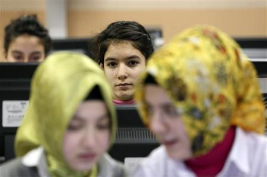The Islamization of Turkey: Erdoğan’s Education Reforms
By Svante E. Cornell (vol. 8, no. 16 of the Turkey Analyst)
The growing efforts at Islamization of Turkish society have largely gone unnoticed. For many years, Islamization was the dog that did not bark: in spite of dire predictions by secularists, the AKP did not introduce conspicuous efforts to Islamize Turkey. But since 2011, this has changed. The main exhibit is the education sector, which President Recep Tayyip Erdoğan has remodeled to instill considerably more Islamic content, in line with his stated purpose to raise “pious generations”. Ultimately, the Islamic overhaul of the education system is bound to have implications for Turkey’s civilizational identity, and on the choices it will make on where it belongs politically.

Turkey’s New Caretaker Government is a Pure AKP Government in Disguise
By M. K. Kaya (vol. 8, no. 16 of the Turkey Analyst)
In violation of the Turkish constitution, Ahmet Davutoğlu’s new caretaker cabinet is a pure AKP government. The government may be temporary, but it is nonetheless nothing but an expression of the determination of the AKP to secure permanent power. Both the process that led to its formation and its extra-constitutional composition bears testimony to the power-grab of the AKP.
What the Columnists Say
Etyen Mahçupyan in Akşam writes that the cease-fire ended because PKK started to seek independence in Rojawa, and because Turkey did not want to have a PKK state at its border. “PKK has shot itself in the foot,” he writes. Metin Münir on the t24 news site finds it incredible that PKK chose to respond to Erdoğan’s restart of the war in what he describes as the most stupid way possible, by returning to terrorism. Orhan Bursalı in Cumhuriyet writes that PKK is laying the ground for secession from Turkey. Kemal Öztürk in Yeni Şafak warns the AKP that the party is losing the public relation battle to PKK among the Kurds, and that yet another electoral disaster is looming. Şahin Alpay in Zaman writes that even though Erdoğan is the chief responsible for why calm and stability continue to elude Turkey, the fundamental reasons for this are inscribed in the genetic code of the republic.

Mahçupyan: PKK shot itself in the foot
Etyen Mahçupyan in Akşam writes that PKK has shot itself in the foot. At a point where it had the chance to force Turkey to a real peace, it seriously damaged its legitimacy by returning to war. Those who want to lend support to the Kurdish political movement now claim that Erdoğan has started the war because he could not become executive president or because he wants an election victory. These speculations are all baseless. The presidency is not part of the events, because a presidential system can only be introduced together with a new constitution, and even if were to come to power alone the AKP could not propose such a constitution by its own, because it would not be able to ensure the necessary legitimacy and permanency of the endeavor. Nor is there any logic behind the speculation about starting a war in order to win the election; because if such a perception has been established, you are not going to win an election anyway. Besides, if this is indeed the AKP’s purpose, then you’ll need to find an answer to why the PKK helped the AKP by executing those two police officers. So why did the cease-fire end? It ended because the PKK started to seek independence in Rojava, and because Turkey did not want to have a PKK state at its border. One should not forget that a PKK that establishes itself as a state means that there will be civil war in Turkey anyway. The AKP is not opposed to a Kurdish entity by its border; such an entity can even serve its purposes. But it is against every form of autonomy that is imposed by PKK. Thus, it did not hesitate to exploit the PKK’s serious mistake and reciprocated the invitation to end the cease-fire.
Münir: PKK chose the most stupid answer to Erdogan
Metin Münir on the t24 news site writes that Erdoğan, after tasting his first election defeat, turned his ire and hate against HDP and its leaders. He ended the solution process. He sent the air force to bomb Kandil. PKK, the target of this attack, had many choices; without hesitation, the PKK chose the most stupid one. It started to spread terror. Maybe the leaders of the PKK, like all other aging warlords, could not accept that they are no longer in tune with the times, maybe they could not bring themselves to accept that the time has come for them to leave the initiative to the civilians. Whatever Erdoğan does, the most rational thing for the PKK to do is to pull out its warriors from Turkey and concentrate on the fight against ISIS.



